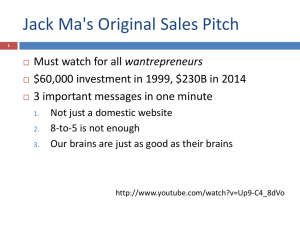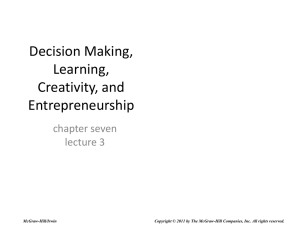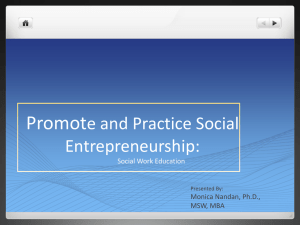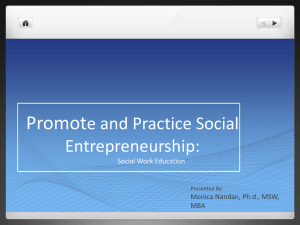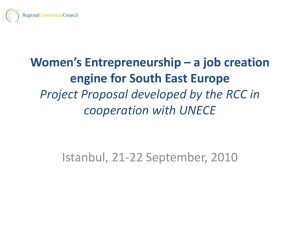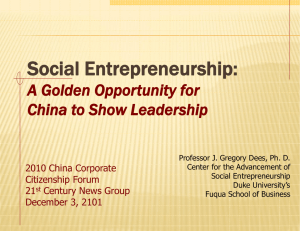Creating an Entrepreneurial Culture/Community
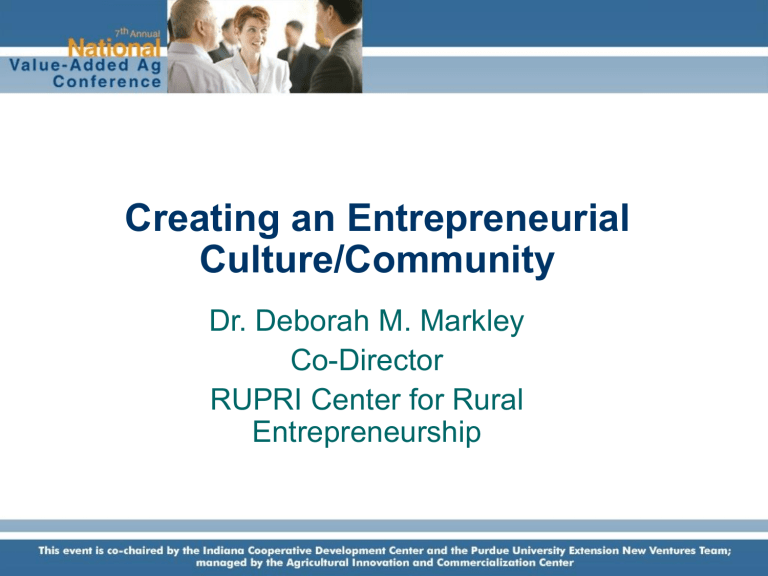
Creating an Entrepreneurial
Culture/Community
Dr. Deborah M. Markley
Co-Director
RUPRI Center for Rural
Entrepreneurship
7th Annual National
Value-Added Ag Conference
Indianapolis, Indiana
June 16-17, 2005
Unique Challenges to Rural
Entrepreneurship
Culture often does not support entrepreneurship
Entrepreneurs are isolated from peers and mentors
– networking difficult
Entrepreneurs fly below the radar screen of local economic development officials
Rural communities “waiting to be saved” – dependency alive and well
Need to take a portfolio approach to investing in entrepreneurship - challenging
Why create an entrepreneurial culture/community?
Entrepreneurs thrive in a supportive environment
In a supportive culture, leaders accept losses that WILL occur but continue support for entrepreneurship anyway
Outcomes from entrepreneurship occur over the long term – need a culture of entrepreneurship to stay in the game for the long haul
How to create an entrepreneurial culture/community
Leadership
Youth engagement
Celebrate Success
Learning from others
Leadership
Broad based: immigrants, women, new arrivals, young people
Involve entrepreneurs: “by and for entrepreneurs”, engage them where they are
Engage community in strategy development: seek input; share results
Policy change: entrepreneur-friendly policies send a message (e.g., zoning for homebased businesses)
Example: Georgia’s Entrepreneur
Friendly Communities
Statewide, community-based Entrepreneur
Network (ENet): GA Tech in partnership with state ED
Community process to establish entrepreneur support program: review visit to determine E Readiness; strongly focused on assets
Learning network of E Friendly communities
Example: Home Town
Competitiveness
Leaders are made, not born
Ord Nebraska: Leadership Quest program
–
–
Formal, skill building program: 20-25 people annually (including youth)
Meet monthly for 9 months
–
–
More people running for office, working on community projects, serving on boards
Recognized by Nebraska as top rural development strategy in 2003
Youth Engagement
View youth as change agents
Leadership (as in HTC)
Entrepreneurship education in schools, after school programs
Need to move from “teacher driven” to institutionalized approach
– Consortium for Entrepreneurship Education national standards
Examples: Curriculum and WV
Dreamquest
Rural Entrepreneurship through Action
Learning (REAL): curriculum for K-16; experiential learning
(www.realenterprises.org)
Mini-Society: 8-12 year olds; experiential
(www.minisociety.org)
WV Dreamquest: high school business plan competition (www.wvdreamquest.com)
– 1 st year, over 150 students participated
Celebrate Success
Celebrate to reinforce cultural change (news stories about entrepreneurship)
Celebrate to maintain and build momentum
(highlight successful entrepreneurs, E of the year)
Celebrate to influence policy makers (joint ribbon cuttings)
Encourage innovation (business plan competitions, youth entrepreneurship awards)
Example: Fairfield Iowa’s
Entrepreneurs’ Association
FEA created in 1989 – by and for entrepreneurs (mentoring, networking, seminars, “boot camp for entrepreneurs”)
Celebrate E of the year, E Hall of Fame, new start ups
Over 20 years: created 2,000 jobs; tripled per capita income; rank in top 5 in per capita charitable giving; “Silicorn Valley;” headquarters location for 50 companies
Where do you begin?
Important to get started – don’t need elaborate strategy to write a story or feature entrepreneurs at a chamber dinner
There are tools and resources available – coming soon! E 2 Energizing Entrepreneurs:
Charting a Course for Rural Communities
Visit our website – www.ruraleship.org
Right now…
Start by networking
– Find one person in this room who you DO NOT
KNOW
– Introduce yourself and ask what is happening in his/her hometown to encourage entrepreneurship or to build an entrepreneurial community
– Share what you are doing in your community
– Exchange business cards, follow up!
For More Information
Deb Markley
– dmarkley@nc.rr.com
Don Macke
– don@ruraleship.org
Brian Dabson
– brian@rupri.org
www.ruraleship.org
